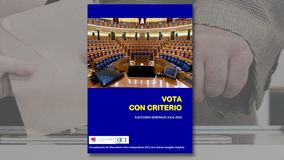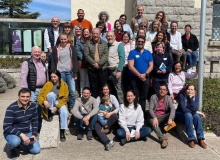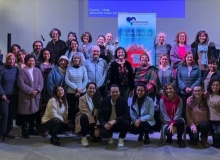

Around 80 businesspeople, professionals and leaders attended the national meeting of Christian Business Leaders held in Valencia.

Evangelicals in Spain and Latin America launch an online School of Political Training, to equip Christians who want to participate in public life. Entering politics without adequate preparation, can lead Christians to “major failures” and “significant frustrations”, they say.
.jpg)
We met in Barcelona with a simple but ambitious goal: to see that all evangelical churches in Spain have an extensive cross-cultural missionary culture.

A Gallup report shows that up to 44% of workers feel stressed. “The Bible talks about stress a much more than we think”, say evangelical experts.

The Spanish government hopes to reduce the working week to 37.5 hours. But work is not the enemy, it is the conditions that do not allow for healthy growth and service, Christians say.
.jpg)
While the Spanish Prime Minister defends in Brussels his law to “start over”, many doubt that undoing the judges' sentences will bring a rapprochement between strongly opposing positions.

Evangelical experts in the labour world look at the proposal to reduce the working hours to 37.5 per week.

The evangelical entity launches a document addressing ten issues of general interest , to give a biblical perspective and encourage evangelicals to “vote wisely”.

Opportunities for complaint can also be opportunities to bear good witness and improve our relationships with those around us.

Almost fifty nurses participated in the event, under the theme 'Leadership in uncertain times'.

A trade unionist, a business owner, and a theology of work expert analyse how to deal with the challenges of labour relations from a biblical perspective.

How does the biblical Christian worldview actually fit into the complex area of labour relations between employers and workers? A trade unionist, a business owner, and a theology of work expert respond.

Eleven years later, Spanish evangelicals will gather for a new Bioethics congress. Non-Christians are welcome in a programme that will address issues such as euthanasia, artificial intelligence, and creation care.

As millions of young people are quitting their jobs to change their lifestyles, Christians engaged in workplace discipleship are reminding that "work done for God is an act of worship".

Evangelicals in Catalonia and the rest of Spain analyse the government's decision to free the convicted leaders of the Catalan independence process.

“Youth ministry has to work on areas such as excellence in life, a correct stewardship of time and resources, and a constant dependence on God that generates confidence in economic entrepreneurship”, says Marcos Zapata.

The annual meeting of the Spanish Evangelical Alliance addressed the challenges of freedom of conscience, the mission of the church, and its role in a society marked by the pandemic.

“We need to put more emphasis on missional discipleship”, says a report of the Lausanne Movement in Spain about how evangelical churches understand mission.

People suffering of certain long-lasting illnesses have become used to self-confinement. But many young people also feel increasingly isolated. What can our churches do to respond to this phenomenon?

The gahtering of the Graduates Bible Groups in Spain challenged Christians professionals to share the beauty of the Christian faith with their coworkers - with excellence, respect and responsibility.

“This decision marks an end to the moral insult that the public glorification of a dictator constitutes”, said the President of Spain, Pedro Sánchez. Under Franco, evangelicals were isolated, silenced and incarcerated.

Christians in Barcelona see a need to find “forums” in churches where the situation in Catalonia can be addressed with “wisdom” and a worldview “rooted in Scripture”.

According to the OECD, the median age of the population will increase from 40 years today to 45 years in 2050. “The church must awaken the mission call that the Lord gave the elderly people”, says a Christian leader.

The biblical work ethics clashes with a system that, according to the International Labour Organization, “experiences a lack of material well-being, economic security, equal opportunities or scope for human development”.

What should fill us with hope is that the present order of things won’t always remain the same: everything will be turned upside down and in the end it is not the powerful that will triumph.

Las opiniones vertidas por nuestros colaboradores se realizan a nivel personal, pudiendo coincidir o no con la postura de la dirección de Protestante Digital.